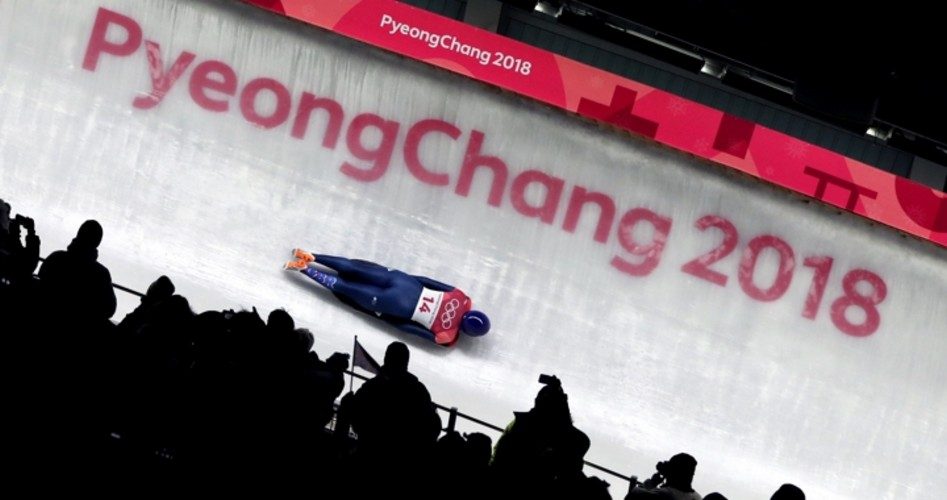
A worldwide sporting event such as the Winter Olympics attracts climate alarmists like moths to a quickly warming flame. Climate-change activists have been busy telling us that the winter games, and winter sports in general, face an existential threat from the specter of man-made global warming. And what better propaganda tool for them than to show thermometers, moist with condensation from warm air, rising ever-so-high into non-winter temperatures?
But there’s a problem on the way to that global-warming hype-fest. The South Korean weather is simply not cooperating. Thus far, temperatures in Pyeongchang have been at record low levels for the Winter Olympic Games. The opening ceremony had to be shortened by two hours due to below-zero wind chills. Several ski events have had to be rescheduled due to high winds and ice pellets. As of this writing, these Olympics are on pace to be the coldest games on record.
It must be awkward to make the case for global warming when Olympic organizers are handing out blankets and heat pads to spectators who attend events. Skiers have complained that their skis have become warped due to the icy conditions. Spectators have been treated for hypothermia.
Ski jumper Noriaki Kasai of Japan, referencing conditions at that event, said, “It was unbelievably cold. The noise of the wind at the top of the jump was incredible. I’ve never experienced anything like that on the World Cup circuit.”
The cold weather flies in the face of the narrative that climate-change alarmists had hoped to float to a worldwide audience, namely that global warming was threatening the very existence of winter sports. Recent climate modeling by the University of Waterloo has shown that, by 2050, at least nine of the past 21 host cities will supposedly be too warm to accommodate the event. According to the study, the cities of Innsbruck, Sarajevo, Oslo, Squaw Valley, Vancouver, Chamonix, Garmisch-Partenkirchen, Grenoble, and Sochi will all be too warm to host the event by the year 2050.
Maybe. But, according to Dr. Roger Pielke, a meteorologist at the University of Colorado-Boulder, such climate modeling has a less-than-stellar track record to this point. “Such claims are based on climate models that have shown essentially no skill at predicting multidecadal changes in regional climate statistics when tested against observed multidecadal regional climate changes and variations over the past decades (called hindcasting),” Pielke said. “If they cannot skillfully predict such changes in the past, we should have no confidence in what they tell us with respect to the coming decades.”
However, David Arkush, a lobbyist and the managing director of Public Citizen’s Climate Program reminds us that weather is not the same as climate. “Nothing in climate science says the temperature today must always be higher than one year ago,” Arkush said. “But the overall warming trend is unmistakable and alarming.”
On February 9, just prior to the frigid opening ceremony, climate activists launched a “Twitter Storm” intended to call out NBC for imposing a “climate whiteout” on the issue of how climate change is affecting winter sports. The plan was to flood Twitter with the hashtag #ClimateWhiteout in an attempt to shame the network into offering more stories about climate change during their Winter Olympic coverage.
“For weeks, NBC has been putting out stories as part of its ‘Road to Pyeongchang’ coverage — featuring profiles on the athletes and stories about their journey to qualifying for Team USA,” said Allison Fisher, the outreach director of the group Public Citizen’s Energy Program. “Not one has mentioned climate change.”
What a cringeworthy statement. NBC is telling the stories of individual athletes and teams and how they worked hard and overcame obstacles to compete in the Olympics. Why would they be compelled to bring a political issue into such stories?
Climate alarmist groups Public Citizen, Protect Our Winters, and Climate Nexus issued a joint statement in the lead-up to the games that attempted to shame NBC into spending a vast amount of airtime showing how global warming will affect winter sports in the future. Part of it read, “Winter sports are taking a huge hit from our warming planet and the athletes who depend on cold weather and snow — are witnessing and experiencing climate change first hand. We can no longer talk about the Winter Olympics without warming.”
Sure, we can. It’s called sports reporting. That is what NBC’s advertisers are paying for, not overwrought soliloquies about political issues. Whether it’s the NFL and players kneeling for the National Anthem or global warming at the Winter Olympics, it’d be nice if we could get back to a world where not everything — even the sports we choose to watch — is politicized.
Photo: AP Images



